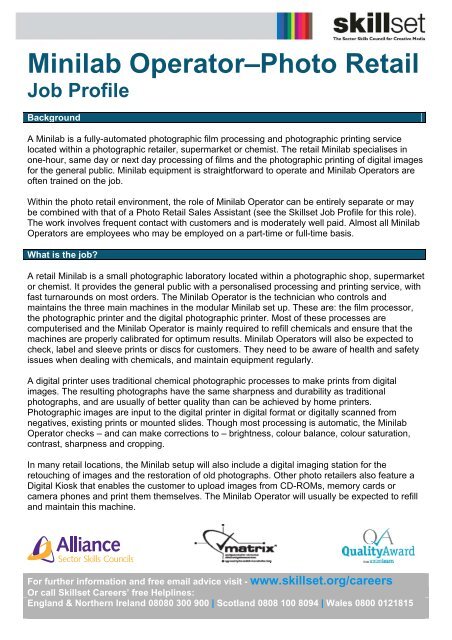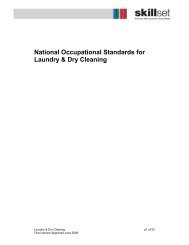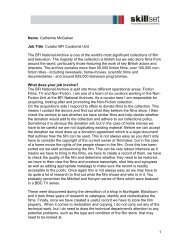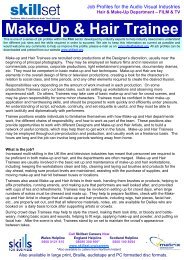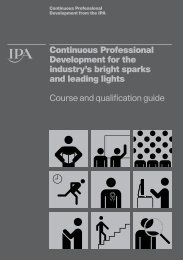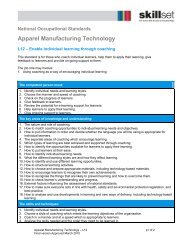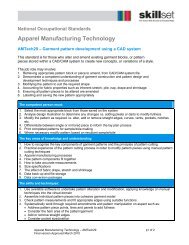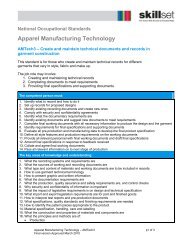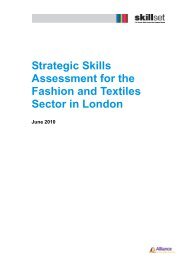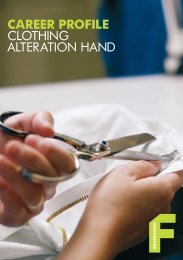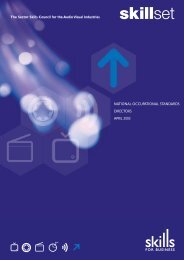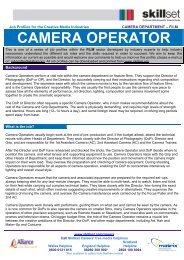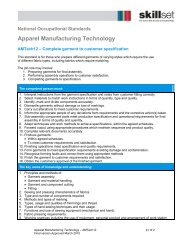Minilab Operator–Photo Retail Job Profile - Skillset
Minilab Operator–Photo Retail Job Profile - Skillset
Minilab Operator–Photo Retail Job Profile - Skillset
Create successful ePaper yourself
Turn your PDF publications into a flip-book with our unique Google optimized e-Paper software.
<strong>Minilab</strong> Operator–Photo <strong>Retail</strong><br />
<strong>Job</strong> <strong>Profile</strong><br />
Background<br />
A <strong>Minilab</strong> is a fully-automated photographic film processing and photographic printing service<br />
located within a photographic retailer, supermarket or chemist. The retail <strong>Minilab</strong> specialises in<br />
one-hour, same day or next day processing of films and the photographic printing of digital images<br />
for the general public. <strong>Minilab</strong> equipment is straightforward to operate and <strong>Minilab</strong> Operators are<br />
often trained on the job.<br />
Within the photo retail environment, the role of <strong>Minilab</strong> Operator can be entirely separate or may<br />
be combined with that of a Photo <strong>Retail</strong> Sales Assistant (see the <strong>Skillset</strong> <strong>Job</strong> <strong>Profile</strong> for this role).<br />
The work involves frequent contact with customers and is moderately well paid. Almost all <strong>Minilab</strong><br />
Operators are employees who may be employed on a part-time or full-time basis.<br />
What is the job?<br />
A retail <strong>Minilab</strong> is a small photographic laboratory located within a photographic shop, supermarket<br />
or chemist. It provides the general public with a personalised processing and printing service, with<br />
fast turnarounds on most orders. The <strong>Minilab</strong> Operator is the technician who controls and<br />
maintains the three main machines in the modular <strong>Minilab</strong> set up. These are: the film processor,<br />
the photographic printer and the digital photographic printer. Most of these processes are<br />
computerised and the <strong>Minilab</strong> Operator is mainly required to refill chemicals and ensure that the<br />
machines are properly calibrated for optimum results. <strong>Minilab</strong> Operators will also be expected to<br />
check, label and sleeve prints or discs for customers. They need to be aware of health and safety<br />
issues when dealing with chemicals, and maintain equipment regularly.<br />
A digital printer uses traditional chemical photographic processes to make prints from digital<br />
images. The resulting photographs have the same sharpness and durability as traditional<br />
photographs, and are usually of better quality than can be achieved by home printers.<br />
Photographic images are input to the digital printer in digital format or digitally scanned from<br />
negatives, existing prints or mounted slides. Though most processing is automatic, the <strong>Minilab</strong><br />
Operator checks – and can make corrections to – brightness, colour balance, colour saturation,<br />
contrast, sharpness and cropping.<br />
In many retail locations, the <strong>Minilab</strong> setup will also include a digital imaging station for the<br />
retouching of images and the restoration of old photographs. Other photo retailers also feature a<br />
Digital Kiosk that enables the customer to upload images from CD-ROMs, memory cards or<br />
camera phones and print them themselves. The <strong>Minilab</strong> Operator will usually be expected to refill<br />
and maintain this machine.<br />
For further information and free email advice visit - www.skillset.org/careers<br />
Or call <strong>Skillset</strong> Careers’ free Helplines:<br />
England & Northern Ireland 08080 300 900 | Scotland 0808 100 8094 | Wales 0800 0121815
<strong>Job</strong> <strong>Profile</strong> – Photo Imaging<br />
Photo <strong>Retail</strong><br />
<strong>Minilab</strong> Operators may be asked to undertake some Digital Imaging work, such as photoretouching,<br />
recropping, design and layout work, using standard software packages such as Adobe<br />
Photoshop, Aperture, Adobe Illustrator and InDesign. Some <strong>Minilab</strong>s also promote other printing<br />
applications, including the printing of photographic images on T-shirts, mugs and posters, as well<br />
as promotional items for small businesses and social organisations such as business cards, flyers,<br />
stretched canvases and exhibition stands.<br />
Most <strong>Minilab</strong> Operators are full-time or part-time employees working regular shifts which may<br />
include Saturdays and Sundays.<br />
Typical Career Routes<br />
There are no set entry requirements to become a <strong>Minilab</strong> Operator. Most people progress into this<br />
role through customer sales (see the <strong>Skillset</strong> <strong>Job</strong> <strong>Profile</strong> for Photo <strong>Retail</strong> Sales Assistant), and<br />
receive training from the equipment manufacturer or from their more experienced colleagues.<br />
A <strong>Minilab</strong> Operator can gain promotion from this role into management, digital imaging (see<br />
<strong>Skillset</strong> <strong>Job</strong> <strong>Profile</strong>s for Digital Imaging Specialist – Laboratory and Digital Imaging Specialist –<br />
Picture Library), or more specialised laboratory work (see <strong>Skillset</strong> <strong>Job</strong> <strong>Profile</strong>s for the Laboratory<br />
sector).<br />
Essential Knowledge & Skills<br />
To work in this role demands excellent customer service skills and the ability to think on your feet.<br />
The operation of the <strong>Minilab</strong> itself also requires a good level of manual and technical skills. An<br />
interest in photography and experience operating digital imaging and design software, such as<br />
Adobe Photoshop or Illustrator, may also be useful.<br />
On a personal level, <strong>Minilab</strong> Operators should have:<br />
• excellent colour vision<br />
• an ability to assess colour, contrast and density when making corrections<br />
• good concentration and a keen attention to detail<br />
• an interest in photography, photographic techniques and applications<br />
• good communication skills and the ability to confirm customers' instructions<br />
• a calm, methodical and deadline-focussed approach.<br />
On a retail service level they need to:<br />
• enjoy working with the public<br />
• make sure goods are attractively displayed<br />
• provide advice on products and prices the availability of stock<br />
• take payments by cash, card or cheque<br />
• take care of the ordering and delivery of stock.<br />
• On a technical level they should:<br />
• have good numeric skills for calculating processing times, exposures and film speeds<br />
• have analytical and mechanical skills to diagnose faults and maintain equipment<br />
• be creative and have design skills when working in digital imaging.<br />
• have superior computer skills (Mac and PC) and experience of using digital imaging<br />
software such as Adobe Photoshop
• be confident when dealing with difficult and sometimes unexpected situations<br />
<strong>Job</strong> <strong>Profile</strong> – Photo Imaging<br />
Photo <strong>Retail</strong><br />
It is vital that <strong>Minilab</strong> Operators maintain good concentration, even when carrying out routine<br />
tasks. This is important if the company is to maintain quality standards and to prevent damage to<br />
very expensive equipment. Since <strong>Minilab</strong> Operators may sometimes be asked to cover for other<br />
members of the retail sales team during their breaks, it is helpful if they also have a good<br />
knowledge of cameras, camera phones and other photographic equipment.<br />
There are National Occupational Standards (NOS) for Photo Imaging. These give a detailed<br />
breakdown of the knowledge, awareness and skills needed to effectively carry out a particular job<br />
role. The NOS relevant to this job are listed at the end of this profile.<br />
Training and qualifications<br />
Most training is carried out by employers or the manufacturers of specific machines. This means<br />
that no formal qualifications are required to work or train as a <strong>Minilab</strong> Operator. Customer service<br />
skills and a technical aptitude are usually considered far more important than academic or<br />
technical qualifications, and <strong>Minilab</strong> Operators are usually hired with prior <strong>Minilab</strong> experience or as<br />
Photo <strong>Retail</strong> Sales Assistants (see <strong>Skillset</strong> <strong>Job</strong> <strong>Profile</strong> for this role), who are then trained on the<br />
job.<br />
Some employers ask for GCSEs or Standard grades in maths and a science subject and that<br />
applicants have a personal interest in photography, but these are by no means essential<br />
qualifications. Prospective employers are more likely to be impressed if the applicant has good<br />
computer skills, particularly in the use of desktop publishing packages, such as Adobe Photoshop,<br />
Quark, Illustrator or InDesign.<br />
<strong>Minilab</strong> Operators usually train on the job and may also attend short courses run by<br />
manufacturers. It is also possible to study for vocational qualifications while working. <strong>Minilab</strong><br />
Operators usually train on the job and may also attend short courses run by manufacturers. It is<br />
also possible to study for vocational qualifications while working. Employers may support workbased<br />
qualifications, such as Apprenticeships and NVQ/SVQs. Photo Imaging NVQ/SVQs are<br />
currently available at levels 2, 3 and 4.<br />
<strong>Minilab</strong> Operators working in digital imaging may also complete a variety of short professional<br />
development courses or workshops in image manipulation techniques such as Photoshop, toning<br />
and tinting.<br />
Where to go for more information<br />
<strong>Skillset</strong> is the Sector Skills Council for the Creative Media Industries. For information about<br />
training and professional qualifications, links to the <strong>Skillset</strong> network of training partners, and<br />
access to the comprehensive <strong>Skillset</strong> course database, visit www.skillset.org<br />
<strong>Skillset</strong> Careers is the UK’s only specialist media careers advice service delivering individual<br />
career solutions when and how you need them. For detailed media careers information and<br />
advice, contact one of the free careers helplines. Call 08080 300 900 in England (also available to<br />
callers from Wales and Northern Ireland) or 0845 850 2502 in Scotland, or visit the website<br />
www.skillset.org/careers<br />
The Photo Marketing Association (PMA) is an international association representing over<br />
20,000 member companies across the world operating in photo imaging service centres,
<strong>Job</strong> <strong>Profile</strong> – Photo Imaging<br />
Photo <strong>Retail</strong><br />
laboratories, photofinishing and retailing. Established in 1987, PMA UK now has more than 1,000<br />
members across the spectrum of the modern photo imaging industry. The association supports<br />
businesses and provides a forum for the interchange of ideas.<br />
T: 0870 240452 www.pmai.org<br />
The British Institute of Professional Photography (BIPP) is a not for profit association of<br />
professional image makers that aims to improve standards, develop skills and encourage<br />
continuing professional development. The BIPP recognises nine colleges across the UK who have<br />
proved that they have the resources, facilities and expert lecturers necessary to run an effective<br />
professional photographic course. For details of BIPP Qualifications for practising professionals<br />
visit the Membership pages on the BIPP website. For a list of approved colleges, including those<br />
offering the PQE e-mail info@bipp.com. Student Membership is available to students attending a<br />
vocational course in photography at an educational establishment in the UK. The Institute’s<br />
Journal ‘The Photographer’ is supplied free to all members.<br />
T: 01920 464011 www.bipp.com<br />
Last updated 2009<br />
<strong>Skillset</strong> does not endorse or accept responsibility for any of the products, services or content of third party organisations or<br />
websites contained within this <strong>Job</strong> <strong>Profile</strong>, nor does it guarantee the quality of links to the external websites listed. Any concerns<br />
regarding an external link should be directed to its webmaster.<br />
Also available in Large Print, Braille, audiotape and PC formatted disc formats.


